Top 69 Operas
Given the massive popularity of opera on Sputnik I decided that I must jump into the fervent discussions of the what the all-time greatest operas are. I apologize in advance for any lorgnettes I may beset or any feathery coiffures I may ruffle with my controversial opinions. If you're wondering why I limited myself to 69 (when obviously even a list of thousands couldn't cover all the great operas), the clever answer is that it's because opera is easily the horniest of all musical genres (literally the top 5 operas in this list are sex-obsessed)... the more banal answer is that I was really getting tired of working on this list by the time I got to about 60. |
| 1 |  | Richard Wagner
Tristan und Isolde
The musical-dramatic equivalent of blue balls; it builds the tension from the iconic opening chords and doesn’t resolve it for 4-hours (call your doctor if your erection lasts for the entire opera). Wagner's psycho-erotic masterpiece ends with death rather than an orgasm, but the music's magic is that you can't tell the difference. When sung by a great soprano, the Liebestod should reduce anyone to a puddle of tears, and perhaps other bodily fluids. |
| 2 |  | Wolfgang Amadeus Mozart
Don Giovanni K. 527
To the 18th century a cautionary morality tale on the evils of sociopathic seduction. To the 19th century an anti-heroic tale of individuality defying social mores and even hell itself. To the 20th century a complex depiction of the multiplicity of perception. To the 21st century... I guess the music is good enough to distract us from our cell phones for a few minutes… (and maybe this Don reminds us of another recently infamous Don). |
| 3 | 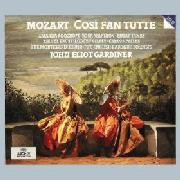 | Wolfgang Amadeus Mozart
Cosi fan tutte, K.588
We begin identifying with the cynical, jaded wisdom of Alfonso and Despina; we end by identifying with the romantically naïve foursome and lamenting the irrevocable loss of their innocence. Though the title was probably meant as a misogynistic joke (“all women do it”), the actual opera satirizes both sexes equally. It’s all set to the most pristinely crystalline, subtly poignant, immaculately perfect music Mozart ever penned. Pull one note and the entire fabric would unravel. |
| 4 | 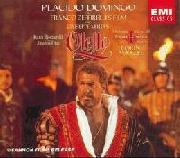 | Giuseppe Verdi
Otello
Better than the Shakespeare masterpiece because Verdi's music is so good it makes us forget that Otello is a psychopath who will murder his wife based on the flimsiest evidence of infidelity. The return of the romantic "kiss" theme at the height of Otello's rage is one of the finest moments in the history of opera and forces us to sympathize with his psychological torment. |
| 5 | 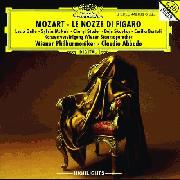 | Wolfgang Amadeus Mozart
Le Nozze di Figaro, K. 492
Downton Abbey with 3-dimensional characters and a less absurd plot. The genius is in how Mozart musically navigates the comedic chaos of the events and the emotional chaos of the characters, with the Countess’s poignant laments undercutting the buoyant fun of Figaro and Susanna, culminating with the most profound act of grace and forgiveness ever set to music. This is the true beginning of opera as a supremely humanist medium. |
| 6 |  | Richard Wagner
Der Ring des Nibelungen
What are you doing for the next 14-hours? Wagner's epic, allegorical psychodrama is worth your time. Hear the original Lord of the Rings, the original film score; listen for Alberich's corruption, Wotan's foolishness, Brunhilde's heroism, Siegfried's awakening, the incest of Siegmund and Sieglinde, the ride of the Valkyries, the hammer song, the first overture depicting creation from chaos, the finale with the immolation of the Gods. Scratch that; it's not worth your time, it's worth your lifelong obsession. |
| 7 | 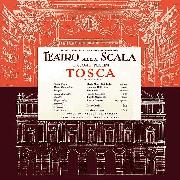 | Giacomo Puccini
Tosca
The official opera of the #MeToo movement. Another story of romantic innocence and naivety destroyed, this time by the calculating evil of power-hungry politics. Puccini's music is ambivalent, playing up both the biting irony and ravishing romanticism, ending with Cavaradossi's resigned desolation and Tosca's deluded desperation, with the most hair-raising murder in all of opera serving as the crux of it all. Much more than the “shabby little shocker” it was initially dismissed as. |
| 8 |  | Giuseppe Verdi
Falstaff
Again Verdi betters Shakespeare, this time by a much more significant margin. It was Verdi's only mature comedy, his final opera, and his most Wagnerian score, being far more through-composed than was typical. It gives the opera an ethereal quality, as if Falstaff had stepped into A Midsummer Night's Dream. Thematically, it’s more The Tempest: Verdi (like The Bard) saying goodbye to his art (“such stuff as dreams are made on”) with a wistful smile. |
| 9 |  | Claude Debussy
Pelléas et Mélisande
The first modern opera is a hypnotically enigmatic work. Debussy adapted Maeterlinck's symbolist play almost verbatim, but the music brings out a whole new dimension. The unusual structure eliminated arias and set-pieces, with one-note-per-syllable in a “continuous, fluid ‘cantilena’, somewhere between chant and recitative.” Ostensibly it's about a love triangle--common opera fodder--but the aesthetic is one of a surrealist dream where we've gone down the rabbit hole, with the impressionistic textures creating a cannabis-like haze over everything. |
| 10 | 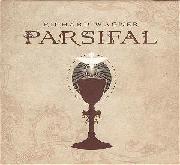 | Richard Wagner
Parsifal
Wagner's supreme reckoning with his lifelong philosophical obsession with Schopenhauer. He said it best himself: "When religion becomes artificial, art has a duty to rescue it. Art can show that the symbols which religions would have us believe literally true are actually figurative. Art can idealize those symbols, and so reveal the profound truths they contain." It’s a ritualistic slow-burn, but replete with much of Wagner’s most majestic and intoxicating music. |
| 11 |  | Georges Bizet
Carmen
You know the tunes (and even the ones you don’t are memorable). Anyone who grew up watching Bad News Bears might think Bizet ripped off the film. The actual opera takes us from lush lyricism to raw verisomo in sync with the characters' psychology, with Carmen herself being perhaps the most provocative (and compulsively watchable/listenable) tease in opera's history; can anyone really fault Don Jose at the end? |
| 12 |  | Giuseppe Verdi
Don Carlo
Verdi wrote half-a-bajillion (only slight exaggeration) versions of this opera in different languages of varying lengths, scenes, and acts. None are perfect, but in any iteration it's a messy masterpiece and Verdi’s richest work, dealing with the crossroads between politics and religion, personal freedom and professional duty, honor and betrayal, love and loyalty… With a huge cast and such complex themes and content it’s no surprise Verdi gave up on trying to make it perfectly cohere. |
| 13 | 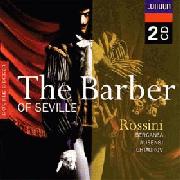 | Gioachino Rossini
Il barbiere di Siviglia
Rossini was Mozart’s musical heir so it’s only appropriate he would pen the prequel to Le nozze di Figaro where the Count and Rosina meet. Compared to his predecessor Rossini is like the equally brilliant but more manic, frenetic, and kinetic little brother. Already he’d mastered Mozart’s penchant for chaotic, comedic ensemble set-pieces with musical fireworks, never to better effect than here where the music reaches dizzying heights in the most indefatigably charming of all operas. |
| 14 |  | Hector Berlioz
Les Troyens
Never let it be said Berlioz wasn't ambitious. Not content with reinventing the symphonic form, with Les Troyens he sought to render Vergil's Aeneid in the French grand opera tradition. For 4 hours it never lets up, from Cassandra's spine-tingling prophecy, to the thrilling storm and hunt, to the chilling finale of the Trojan's departure and Dido's sorrowful swearing of revenge; with Berlioz’s electrifying music galvanizing the power of the drama at every step. |
| 15 |  | Giuseppe Verdi
La Traviata
Chances are you know this story in some form; there's been some 20-odd film adaptations of Dumas's La Dame aux Camélias. Verdi's is the best of them. His Violetta is perhaps the most sympathetic and multifaceted of all opera heroines, and Verdi weaves her downfall with painstaking psycho-musical insight, with a wealth of memorable tunes (especially Libiamo ne’ lieti calici) to remember after the tears. |
| 16 |  | Richard Strauss
Die Frau ohne Schatten
The libretto is like someone stuck Wagner and Verisimo into a blender and had a serial killer sew the mangled remains back together. The music is as complicated—bordering on the nonsensical—as the libretto, but has a black magic power to it, with Strauss conjuring demonic legions of sound from the orchestra that writhes and swirls like expressionistic, moving Hieronymus Bosch paintings. The result is a dark and cryptic fairytale that one awakens from like a fevered nightmare. |
| 17 | 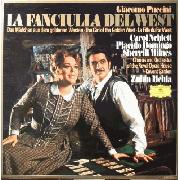 | Giacomo Puccini
La fanciulla del West
Opera’s spaghetti Western. Stifle a guffaw over the fact that the main tenor role is a double double-entendre for “penis” (Dick Johnson) and you’ll find Puccini’s greatest score: part Straussian expressionism, part Debussyan impressionism, part Wagnerian leitmotifs and Stravinskyan harmonic advancements, and some good ol’ Italian lyricism. It’s lacking is the typical Puccinian pathos, but it's nice having a Puccini heroine who isn't a helpless victim. |
| 18 | 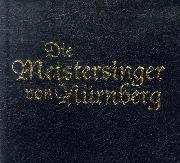 | Richard Wagner
Die Meistersinger von Nurnberg
Wagner never got the message that “brevity is the soul of wit,” so even his lone comedy is still over 4-hours long; but it’s a fast 4-hours with the sunniest, most tuneful music he ever wrote. The plot involves a singing competition in which the winner gets a wife: less overtly mythical than most Wagner, but still well within the realm of fantasy. Thematically it’s Wagner’s Ars Poetica in which he gets revenge on his conservative critics. |
| 19 |  | Giuseppe Verdi
Rigoletto
It’s Verdi’s first top-to-bottom masterpiece and the start of his fertile “middle-period.” It’s also his most tender and lyrical opera, investing the characters and relationships with emotional depth and masterfully setting up the gut-punch of an ending. Perhaps most famous for the stupidly catchy La donna è mobile, which serves as both a commentary on the Duke’s mentality and as the ironic backdrop to the tragedy of the naïve girl willing to sacrifice her life for such a misogynist. |
| 20 |  | Vincenzo Bellini
Norma
There's tension between the more stilted classical elements and nascent romantic ones; but Bellini's billowing, melancholic melodies provide a large canvass for great performers to paint the characters' emotions—no easy task when Norma goes through dozens of different emotional states, often within the same scene. It’s what makes the title role a Mount Everest for sopranos, requiring nothing less than a perfect, versatile technique, beautiful tone, and acting chops to pull it off. |
| 21 | 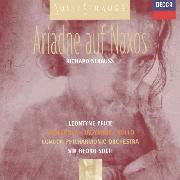 | Richard Strauss
Ariadne auf Naxos
The first half takes place “backstage” as tensions flair when a "high-minded" opera seria troupe is forced to share the stage with a "low-class" comedia dell'arte troupe; while the second half features the opera the first half is fussing about. It's both a love letter to and satire of operatic musical traditions, and Strauss has his cake and eats it too with his opera-within-an-opera, finding a place where comedy and drama, poignant expression and vocal acrobatics can trip side-by-side. |
| 22 |  | Gaetano Donizetti
L'Elisir D'Amore
This opera should come with a smile warning. The libretto is so gossamery and fleet-footed it feels like it could float away. There’s no real conflict—even the “villain” is a likable lummox—and the plot involves a country bumpkin buying a “love potion” (just wine) from a charlatan to attract his capricious crush. Donizetti’s music is like a vending machine of good will, with memorable melody following memorable melody in an unending stream. |
| 23 | 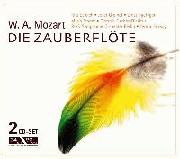 | Wolfgang Amadeus Mozart
Die Zauberflote, 'The Magic Flute', K. 620
Mozart's whimsical fantasy is only marred by the libretto's gross (and blatant) misogyny and racism. Thankfully, to paraphrase William Blake, Mozart was a true composer and of the Queen's party without knowing it. His music not only elevates the opera above the sewers of the mind that penned it, but does so by giving the most luminous music to the party most wronged by its words. |
| 24 | 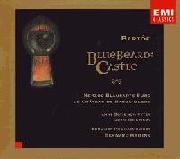 | Bela Bartok
Bluebeard's Castle, Sz. 48
At only an hour Bartok's chamber masterpiece would make a great introduction to anyone whose patience would be tested by typical opera. It's densely packed with unnerving chromatic harmonies that roil through and underneath the voices, evoking the ghostly and ghastly aesthetic of its haunted castle setting; with an equally unnerving symbolic, surreal libretto. It has the power in its climaxes (The 5th Door!) to make the hair on your neck stand up. |
| 25 | 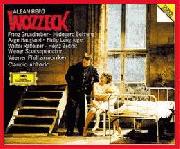 | Alban Berg
Wozzeck
“Man is an abyss” is one of the many lines that could sum up this bleakest of operas. Berg’s atonal music is sumptuous in its color and expressivity, at times lending a grotesque, pitch-black humor to the libretto’s stark and depressive realism. Plenty of operas have depicted a man’s downward spiral into madness and murderous rage, but none have quite captured the feeling that the spiral was a metaphor for the state of the world itself. |
| 26 |  | George Frideric Handel
Giulio Cesare
Before Gluck and Mozart revolutionized opera the genre was dominated by the very mannered Opera Seria, with Handel being the style’s greatest composer. Get past the dramatic awkwardness (and the repetitiveness of the recitative-de capo aria format) and you’ll find an opera with wall-to-wall baroque bangers. Within the artificiality Handel masterfully imbues the characters with psychological depth musically that is simply absent on the page, making it easy to see why Mozart and Beethoven revered him. |
| 27 | 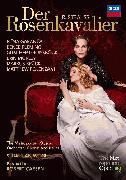 | Richard Strauss
Der Rosenkavalier
After the horrors of Salome and Elektra, Strauss channels his inner Mozart (and the OTHER Struass) for his most Viennese opera, complete with an eminently hummable waltz theme. Ostensibly a comedic play of a lecherous Baron getting his comeuppance, it transforms it into an existential exploration of transience, with Strauss making it a glorious showcase for the trio of female voices and much of his most euphoric music with kaleidoscopic orchestral colors and textures. |
| 28 |  | Modest Mussorgsky
Boris Godunov
Mussorgsky wrote two distinct versions: the original is more concise and focused on the Tsar’s growing madness over his murder of the young tsarevich; but it’s a sausage fest (no major female roles!). The revised version is richer: sprawling, episodic, but verging on incoherency with the lack of connective tissue between scenes. In either version Mussorgsky’s music is iconoclastic, and seems more modern and original the further we get from it. |
| 29 |  | Giuseppe Verdi
Aida
If Verdi was Shakespeare, Wagner was Milton; then Meistersinger is Milton trying to write As You Like It, and Aida is Shakespeare trying to write Paradise Lost. Verdi's mythicism is mostly limited to the foreign allure of the Egyptian setting, but the music it provokes is far more atmospheric than his usual fair, and in its most static moments it faintly reminds me of the quasi-religious ritualism of Parsifal, though still imbued with Verdi’s trademark humanism and emotionality. |
| 30 | 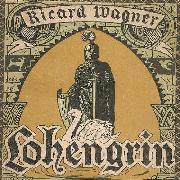 | Richard Wagner
Lohengrin
A woman is accused of murder, a king orders the case settled by duel (as they do), she prays and a hero arrives on a swan-pulled boat (as they do), and his power resides in nobody knowing his name or origin (as it does); and somehow Wagner writes music so glorious it makes us forget the absurdity of it all, and even finds time to write the iconic Wedding March. |
| 31 |  | Pyotr Tchaikovsky
Eugene Onegin, Op. 24
A titan of Russian music adapts a titan of Russian literature. Tatyana is one of opera’s rare introverts, and her psychological evolution is matched by Tchaikovsky’s evolving musical portrait. Similar to Don Giovanni, Onegin must play up the more static, roguish charm to offset her volatile romanticism, making their final encounter one of the most devastating in all opera. Tchaikovsky’s music is supremely lyrical, though often walking a thin line between schmaltz and profundity. |
| 32 | 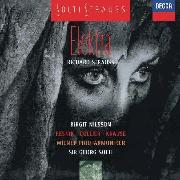 | Richard Strauss
Elektra
Arguably the apogee of opera as Modernist horror. Its one-act structure is built on a series of dramatic monologues and dialogues that lend it a focused austerity that amplifies the intensity of its characters’ psychoses, transforming the external horrors of Salome into internal ones. Hofmannsthal’s libretto delves into the heart of darkness and Strauss’s music follows like an apocalypse in its wake, frothing like a rabid animal and sparking like frayed power lines. |
| 33 | 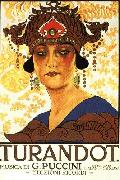 | Giacomo Puccini
Turandot
Puccini’s attempt at an Oriental fairy tale inspires some of his most imaginative music—including the immortal Nessun Dorma—but there’s little dramatic substance to be found. Sopranos playing the title role have the unenviable task of surmounting the stentorian (quasi-Wagnerian) vocal demands in service of one of the most unlikable characters in all of opera. More mysterious than Turandot’s “three riddles” is why in the world Calaf chooses her over Liu to begin with! |
| 34 | 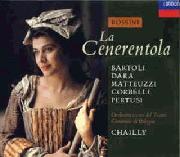 | Gioachino Rossini
La Cenerentola
The cynic might call this a retread of Rossini's Barber; but the musical nuances are plentiful, such as how Rossini's music offsets Angelina's individuality against the group dynamics of the rest of the cast. Despite being a more down-to-earth take on the Cinderella fairy-tale (no fairy-godmothers and glass slippers here!), Rossini’s shimmering, effervescent music lends its own merry magic to the work. |
| 35 |  | Benjamin Britten
Peter Grimes
You can smell the salt and feel the sea breeze in Britten’s score for this opera about a fisherman suffering from an insular town’s gossip after his young apprentice dies at sea. Its greatness is in the balance between dramatic pathos, palpable atmosphere, and lush musicality. Dramatically it borrows from Boris Godunov’s mad individual VS outraged society choruses while the copious interludes majestically set the tone between scenes, grey and grave as massing storm clouds. |
| 36 |  | Giuseppe Verdi
Il trovatore
The story is the epitome of convoluted, melodramatic nonsense, but in a way it’s also the perfect springboard for what is Verdi’s boldest, brashest, most boisterous score that fires on all cylinders from the opening of the overture. It’s also a vocal tour-de-force, requiring no less than four top-tier singers to pull off due to its fusion the long lines and vocal acrobatics of bell canto with the massive dynamic range typically reserved for spinto singers. |
| 37 | 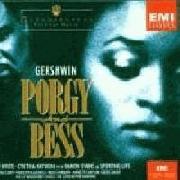 | George Gershwin
Porgy and Bess
The greatest American opera from the greatest American composer hits the sweetest spot at the crossroads of the musical traditions of European classical, American jazz, and Broadway. The “is it even opera?” debate misses the point that it’s a musical-dramatic masterpiece regardless of genre, as well as an American cultural touchstone. Many of its numbers are now standards (especially the immortal Summertime), but even more impressive is how it spawned other masterpiece adaptations like the Miles Davis/Gil Evans version. |
| 38 | 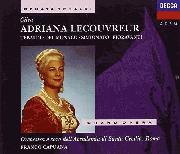 | Francesco Cilea
Adriana Lecouvreur
The first half is pure musical pornography with Cilea surgically engineering showstopping arias including some meltingly voluptuous duets. The second half is a more methodical and psychological affair with the fallout from the Maurizios affairs with both Adriana and the Princess resulting in a vicious cat-and-mouse game. There’s a persistent tonal and perspectival ambiguity, and the finale’s death “betters” even La Boheme for absurdity, but the music’s Puccinian sensuality carries it well. |
| 39 |  | Gaetano Donizetti
Don Pasquale
Don Pasquale marked both the peak and end of opera buffa in the 19th century and is functionally a commedia dell’arte piece. It was one of the last operas Donizetti completed and has a breezy, effortless, but wizened virtuosity to it, buoyed by its plumule melodies and the breathless pacing that gathers energy like a snowball rolling downhill. As with Shakespeare’s Twelfth Night, the challenge is in making the action comedic rather than cruel. |
| 40 | 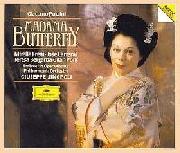 | Giacomo Puccini
Madama Butterfly
A touch better than Boheme if only because the tragedy has a human cause in the insouciant lout that is Pinkerton. Puccini still plays up the melodrama, but Cio-Cio-san is a more complex and sympathetic character than Mimi. As with all Puccini the music is delicate, sensitive, and rapturous at its best, and again the setting’s foreign allure ignites his musical imagination, with its Wagnerian richness channeled into more down-to-earth stories. |
| 41 | 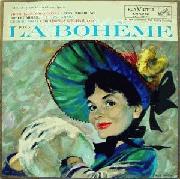 | Giacomo Puccini
La bohème
As a comedy it's a masterpiece; as a tragedy it represents the worst of opera--silly, unearned melodrama that stretches our credulity rather than tugging at our heartstrings. The velvety textures of Puccini's music is almost enough to make us forget it, and at least we still have the wonderful first two acts, and the passionate love duets that’s almost enough to make me feel for Mimi’s demise. |
| 42 |  | Richard Wagner
Tannhäuser
A kind of trial run for Parsifal finds the much younger Wagner already wrestling with themes of redemption, though unlike Parsifal’s mysterious postlapsarian abstractions Tannhauser finds its hero already under the thrall of Venus’s libidinous charms. The overture is arguably Wagner’s best, and he liked it well enough to rework it later into the Pilgrim’s chorus, and again into the finale. The theme’s purity serves as the foil to the Venusberg’s carnality; the spirit’s clarion call amidst the sins of the flesh. |
| 43 | 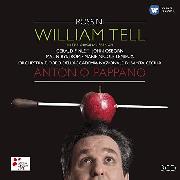 | Gioachino Rossini
Guillaume Tell
It was Rossini’s last opera before he retired at the ripe old age of 37 (like a boss), and he writes as if he knew it was. Though mostly known for its famous overture, the rest of the opera is even better with Rossini pulling out all the compositional stops with the vibrant verve of his comedies channeled into a surprisingly competent adaptation of Schiller’s play about a Swiss marksman’s fight for independence against a brutal Austrian bailiff. |
| 44 |  | Antonin Dvorak
Rusalka
Making a tragedy out of a Little Mermaid-like fairytale was an odd choice, and it’s more craft than art, but as with Dvorak’s instrumental music any concerns about profundity are washed away in tidal waves of melodic beauty and evocative tonality. At times it feels like a diluted Wagner or Verdi, but it shines when Dvorak leans into the dark fantasy setting for inspiration. Most original is how Rusalka spends most of the 2nd Act mute! |
| 45 |  | Gaetano Donizetti
Lucia di Lammermoor
Written just after the retirement of Rossini and the death of Bellini, Lucia is Donizetti confidently asserting himself as the (at that time) lone king of Italian opera. The libretto is the classic “star-crossed lovers from rival families” story, but immensely enlivened by Donizetti’s music that’s equal parts dramatically riveting, romantically ravishing, and beautifully heartbreaking, especially during Lucia’s “mad scenes” that remain the greatest ever composed in a genre saturated with them. |
| 46 |  | Benjamin Britten
Billy Budd
A rare perfect operatic adaptation of a literary masterpiece, the libretto pares down Melville’s novella but loses nothing of its profound themes on the conflicts of consciousness as reflected on in haunted memories. Britten depicts that conflict in music that shifts from pensively moody, to heroically rousing, to brimming with hushed intensity, frequently using unstable, ambiguous chords and vacillating notes that waver like a ship at sea, or perhaps a mind on the sea of consciousness. |
| 47 |  | Vincenzo Bellini
La sonnambula
The provincial, idyllic setting is the perfect correlative to Bellini’s simplified harmonies and orchestration, though the sophistication of his mellifluous melodic writing, smooth and sweet as honey over melting butter, speaks to the reality of the inner lives of the people that inhabit it. The libretto is silly if you stop to think about it—a girl is accused of infidelity after sleepwalking into a visitor’s room at night—but the music’s spell suspends our incredulity. |
| 48 |  | Christoph Willibald Gluck
Orfeo ed Euridice
Gluck revolutionized opera with this work. Technically, he eliminated de capo arias, replaced secco recitatives with accompanied ones, simplified the plots and vocal writing, and complexified the role of the orchestra. The result was a greater synthesis of drama and music, one in which each galvanizes the other at every moment, creating a denser, more focused, coherent, and intense work of art that would have an incalculable influence on the later masterpieces of Mozart and Wagner. |
| 49 | 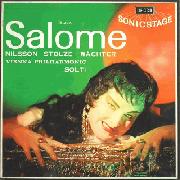 | Richard Strauss
Opera: Salome
The libretto is all shock and awe, especially its ending that has Salome monologuing to a decapitated head; but Strauss’s music is more agony and ecstasy, with its opulent textures emphasizing the hedonistic evils of Herod and Salome (most notably in the licentious sensuality of Salome’s Dance of the Seven Veils), and contrasting with the spiritual dearth of the prophet (John the Baptist) who’s imprisoned in a cistern. Powerful and provocative, even a century later. |
| 50 |  | Wolfgang Amadeus Mozart
Idomeneo
Mozart’s first operatic masterpiece is also one of the greatest opera serias. Already Mozart had absorbed the influence from Gluck’s “reform” operas and Idomeneo finds his genius rattling against the shackles of opera seria’s limiting form, with much greater musical-dramatic fluidity than the genre typically allowed. It’s also filled with some of his darkest, most “sturm und drang” music. Those thinking Mozart is often too polite and refined should give a listen to this barnburner. |
| 51 |  | Igor Stravinsky
The Rake's Progress
Inspired by a series of paintings by Hogarth and written by the great English poet WH Auden, Stravinsky turned The Rake’s Progress into one of the masterpieces of his neo-classical period. Like a dancer whose upper body is all elegance while their lower body performs the most complicated movements, Stravinsky’s music maintains a Mozartean surface of clarity and melodicism, while the harmonies pirouette, the rhythms ciseaux, and vocal lines arabesque in an intricate dance. |
| 52 |  | Giuseppe Verdi
La forza del destino
It was neither the first nor the last time that Verdi’s music would rescue a crappy libretto from the dustbin of history. Even more than with Trovatore or Ballo, Forza strains credulity, but Verdi’s genius is that of a sleight-of-hand illusionist, with his music generating such kinetic momentum that it feels as unstoppable and inevitable as a “force of destiny” itself so that that the audience never has time to catch its breath and ponder over the contrivances of the plot. |
| 53 |  | Henry Purcell
Dido and Aeneas, Z.626
Purcell’s Dido and Aeneas reigned as the greatest English opera (almost undisputedly) for over 250 years until the works of Benjamin Britten, and even predates (and hugely influenced) the works of Handel. Despite its brief runtime it’s packed with memorable melodies and choruses, imaginative use of harmony, vivid word painting, and arguably the saddest, most mournful aria ever in Dido’s When I Am Laid in Earth, still capable of eliciting tears from a sensitive listener. |
| 54 |  | Olivier Messiaen
Saint François d'Assise
Its action and pacing make Parsifal look like The Fast and the Furious, but Messiaen’s largely static tableaus based on events in the life of St. Francis is the culmination of his life’s musical innovations and obsessions. This isn’t an opera you experience for the drama, it’s one you experience for its spiritual and meditative tone, as well as for its overwhelming and mesmeric sound-world that dazzles with alien-like flora and fauna at every turn. |
| 55 |  | Charles Gounod
Faust
The libretto bastardizes Goethe’s literary masterpiece, robbing it of its philosophical profundity and the characters of their psychological depth, but Gounod does his best by composing the most memorable music to a Romantic French opera outside of Carmen. If you can overlook the superficiality of it all there’s a lot to love, including arguably opera’s funnest bass role in Mephistopheles, with his drinking songs being one of the highlights. |
| 56 |  | Jean-Philippe Rameau
Hippolyte et Aricie
Rameau was 50 when he wrote this, his first opera, which managed to cause a rift in France’s musical culture between the conservatives supporting his predecessor, Lully, and the progressives who praised the work for having enough music to fill ten operas. Superficially it’s still entrenched in baroque musical idioms, but it’s easy to see how Gluck took inspiration from its “excess of music:” its dissonances, virtuosity, and greater variety of musical expression and divertissements. |
| 57 | 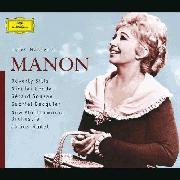 | Jules Massenet
Manon
The epitome of Belle Epoque opera, and, for better or worse, the sentimental excesses of Romanticism, the story of Manon Lescaut inspired both Massenet and Puccini to write operas within a decade of each other. Massenet’s is more elegant and nuanced with his Manon a more slippery character to pin-down emotionally, from her naïve, coquettish origins to the materialistic, frivolous socialite she becomes. She's never the most sympathetic character, making one wonder what so fascinated Massenet and Puccini. |
| 58 | 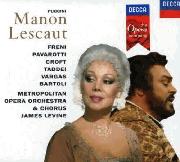 | Giacomo Puccini
Manon Lescaut
Puccini’s Manon Lescaut is a more hot-blooded affair, his heroine made more sympathetic and one-dimensional by focusing less on her infidelity and materialism and more on the emotional fallouts from the affair. Musically Puccini employs his Wagnerian influences for the first time to ostentatious (but emotionally moving) effects, especially in how the polyphonic first act gives way to the pared down 2nd and 3rd acts, and finally the despair and desolation of the final act. |
| 59 |  | Pietro Mascagni
Cavalleria rusticana
Typically presented as a double-bill affectionately called “Cav-Pag,” Cavalleria Rusticana and I Pagliacci were two short operas that epitomized the Verisimo style. Besides the briefness, they have in common stories of infidelity that end in murder. Of the two, Cavalleria is the more lyrical, patient piece; taking a surprising amount of time to build the drama of its relationships, but with so much bewitching music coloring the setting and characters it never feels ponderous. |
| 60 | 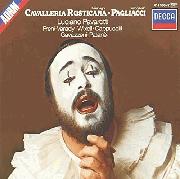 | Ruggero Leoncavallo
Pagliacci
While Pagliacci’s music isn’t as consistently compelling as Cavalleria’s, it’s the more dramatic of the two, making up for its musical deficiencies in moments of explosive power. Its most famous moment comes with the aria “Vesti la guibba,” which contains the even more famous “Ridi, Pagliaccio” fortissimo outburst (you’ve probably heard Pavarotti singing this, if just in passing). The finale in which the murder takes place on stage is one of opera’s great metafictional moments. |
| 61 | 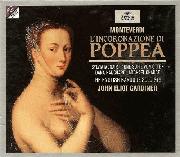 | Claudio Monteverdi
L'incoronazione di Poppea
While the very first opera dates from around 1600, opera’s first masterpiece was Monterdi’s L’Orfeo in 1607, with Poppea being his last (and greatest) written in 1643. While the genre yet lacks the greater fusion of music and drama it would find from Gluck onwards, Monteverdi’s work is still profuse in melodic and harmonic interest, with a surprisingly morally ambiguous libretto that finds the greedy and lustful Poppea winning in the end. |
| 62 |  | Richard Wagner
Der Fliegende Holländer, WWV 63
Wagner spent 3 weeks on a ship beset by storms and high seas, the experience of which undoubtedly informed the music of Der Fliegende Hollander where turbulent winds and rain blow like a wrathful tempest through every page of the score. It Wagner’s first mature opera, and though simpler than the later masterpieces it’s filled with a palpable, electric energy, and already contains many of the motifs and themes he’d explore throughout his career. |
| 63 |  | Jacques Offenbach
The Tales of Hoffmann
Poor Hoffman just can’t get a girl: One’s a whore, one dies, and one was never even alive, and he’s consistently plagued by a quasi-Mephistophelean antagonist. Offenbach was famous for his “operettas” (“light operas”) with Hoffmann being his lone “capital-O” Opera, though there’s not much—besides the length and lack of spoken dialogue—to mark the difference. The tone is still light, and Offenbach’s rare knack for sticky melodies is apparent throughout. |
| 64 |  | George Frideric Handel
Agrippina
With Agrippina Handel had that rarest of luxuries: a surprisingly good baroque libretto. He made the most of it by creating a quasi-pasticcio of his own and other composers’ previous works immaculately tailored to this opera’s needs. He finds musical correlations for the characters’ duplicitousness, while balancing the predominant humor with moments of genuine emotional depth; and despite the multidimensional characters and absurd convolutions of the plot, it coheres remarkably well. |
| 65 |  | Wolfgang Amadeus Mozart
Die Entführung aus dem Serail
The opera with "too many notes" as the Emperor in Amadeus quipped. Of course Mozart was right and there are just as many notes as are necessary in this, the first of his comedic masterpieces. While it doesn't yet possess the humanistic richness of his later works, in its place is a musical (and vocal) virtuosic tour-de-force; the work of a prodigy just coming into the full bloom of his talents. |
| 66 |  | Giuseppe Verdi
Un ballo in maschera
It’s like alchemy; Verdi takes the excrement that is the libretto, dips it in his boiling beakers, scribbles some notes on a page, throws that in the bubbling concoction with some enchanted intoning, and spins gold from it; a belabored metaphor for saying the story is shit, but the music is magic enough it doesn’t matter. It was a favorite of Pavarotti as the protagonist presents a complex vocal challenge, inviting a variety of possible vocal styles and expression. |
| 67 |  | Umberto Giordano
Andrea Chenier
The love story is rather banal, but the French Revolution provides an enrichening historical backdrop. The title role is one of the great showcases for powerhouse tenors. Giordano isn’t afraid of pushing their range to its limits multiple times, and while not as taxing as some of Wagner’s “heldentenor” roles it will just as easily bring the house down when sung by the likes of Pavarotti, Corelli or (more recently) Kaufmann. |
| 68 |  | Ludwig van Beethoven
Fidelio, Op. 72
The best thing to come of Beethoven’s lone opera was the Leonore overture (#3), which is frequently performed between acts. For all his genius, Beethoven was not a natural composer for the human voice and it shows in some of the awkward vocal writing. Still, his dramatic orchestral powers are on full display, and thematically it encapsulates many of the themes that obsessed Beethoven, including freedom, justice, sacrifice and heroism. |
| 69 | 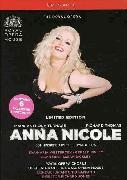 | Mark-Anthony Turnage
Anna Nicole
Though not a legit top 100 opera it’s an excellent representative of a contemporary, postmodern one. The libretto embraces the vulgarity of its subject, even including an ensemble piece on Anna’s boob job, just as the music embraces an array of musical genres including jazz and pop. It works best in its comedic first half while losing some steam in the second as it fails to find much depth to explore in its ultimately superficial characters. |
|
